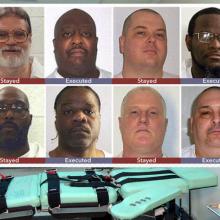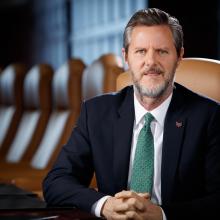Commentary
In 2010, a terrible earthquake struck Haiti that caused the deaths of over 100,000 people and destroyed much of the country’s infrastructure. The U.S. granted TPS to 58,000 Haitians to live in safety and rebuild their lives, work, and support family members still in Haiti.
As the country and world saw last night, without any warning or usual procedures, President Donald Trump fired FBI Director James Comey. The only reason given for Comey’s firing was his treatment of Hillary Clinton’s e-mail case — which is laughable, given Trump’s own past statements and myriad contradictions on these matters, even if one agrees that Comey’s behavior and double standards in regard to that case were unprecedented and indefensible.
Lately, we’ve heard a lot about threats to religious freedom in the U.S. We don’t have to look very far to see the consequences of this truth: Attacks on mosques and temples have been consistently rising, and many fear for their physical safety due to their expressions of faith. Yet in November 2016, many Christians reported voting according to fears that their religious freedoms were in danger. On Thursday, the president signed an executive order purportedly to expand “religious liberty,” aimed at protecting Christian freedoms and extending their churches’ political power — which begs the question: Are Christians in the U.S. being religiously persecuted? It depends on who you ask. No really.
Pollution, poverty, and war take their toll on our health in ways beyond our control, and yet health care in our nation is still treated as a commodity for those who can afford it, rather than as a right for all. It is unthinkable that our nation can build pipelines that poison clean drinking water but expect citizens to suffer without affordable treatment due to lead exposure. It is unacceptable that some communities are trapped in cycles of poverty through discrimination often born of racism but cannot afford the medicine they need because their money must go to cheap, often less-nutritious food. And while it is unconscionable that our nation spends more on destroying lives abroad than it does on saving lives at home, the damage from war exceeds mere monetary cost. Investing in fighting an enemy abroad fuels enmity and distrust at home, putting undo stress on us and eroding our sense of compassion.
You might think these men were sentenced to death and slated for execution simply because of the gravity of their crimes. You’d be wrong.
There is something beyond the terrible crimes that determined their fates even more so: poverty. The death penalty preys on poor and vulnerable populations.
The American Christian church once again finds itself at odds with itself, especially in the aftermath of the election of Donald Trump. On all sides, there are a lot of questions. To understand where we are, we must look at where we’ve been ...
In Guardians of the Galaxy Vol. 2, out this weekend, Peter Quill (Chris Pratt), Gamora (Zoe Saldana), Drax (Dave Bautista), Rocket, (Bradley Cooper) and Groot, (Vin Diesel) are still learning lessons in openness and humility. But oddly, the film they’re in needs help maintaining emotional honesty, too. Where the first movie kept a fine balance of pathos and jokes, the second Guardians film is almost caustically cynical. The film is so preoccupied with witty banter that it misses nearly every opportunity to plumb the depths of the themes it presents, until finally pulling it together at the very end.
Today, I have found freedom and hope — not by becoming straight, but by embracing my queer sexuality and coming out of the closet. New research on the science of sexual orientation as well as personal stories of well-adjusted and happy LGBTQ people helped me reject the religious system that told me there was something wrong with me because I was gay. Recently, the word “survivor” has felt as an appropriate label for myself in relation to reparative therapy, and I am so thankful to be in a much more welcoming environment today. But I cannot ignore the fact that many people today, including a lot of children and adolescents, are still being subjected the psychological torture that is conversion therapy.

Image via Benoit Daoust/Shutterstock.com
Through the Sisters of Salaam Shalom, Jewish and Muslim women are coming together to discover their similarities and bond together as friends and fellow travelers in the world. They are finding common ground, language, or customs to be bridges to relationships. They are not allowing the world to separate them.
Luke 6:31 Do to others as you would have them do to you.
The Christian faith shouldn’t be defined by presidential orders and government mandates. Instead, it’s perfectly represented by the person of Jesus Christ, who told us to love our neighbors as ourselves and do unto others as we would have done to us.
The issue here is not Christians voting differently from each other. That is normal and likely healthy given the independence that people of faith should show over partisan loyalties. This is about the moral hypocrisy of white American evangelical religious right leaders like Jerry Falwell Jr. causing a crisis in the church, dividing American Christians on racial lines, and astonishing the worldwide body of Christ — the international majority of evangelical Christians who are people of color — and whose leaders keep asking many of us what in the world is going on with white American evangelicals.
Tucked up near the Austrian border, about 160 miles from Budapest, is a small Hungarian town of 12,000 people. It’s a quiet place about three and a half hours, and two trains rides, from Hungary’s capital.
But the community has been split by the decision of the local Catholic parish priest, the Rev. Zoltan Nemeth, to allow some asylum-seekers to take shelter in a church building.
The talk — a surprise for all in the audience — recapitulated the key themes of the Argentinian pope’s view of the human person: We are all related and interconnected; scientific and technological progress must not be disconnected from social justice and care for the neighbor; and that the world needs tenderness.
I am a scholar of modern Catholicism and its relations with the world of today. From my perspective, there are two essential elements of this talk that are important to understand: the message of the pope and his use of the media.

Image via A McLin/flickr.com
We are living in a time of unprecedented economic disparity between the rich and the poor, the haves and the have-nots. Masses live in poverty so that a handful of people can live as they wish. The world’s three richest people own more than the combined economies of 48 countries. The average CEO in the US is making 400 times the average worker.
Growing up, I heard stories about random acts of kindness, anonymously dropping off gifts for people, blessing them in some way as to remind them that they are not alone. It was almost a Christian duty to spread kindness like this, because it was kindness without expecting anything in return. I thought about doing that for these neighbors, leaving a simple note or just a bouquet on their doorstep, but that’s not what was needed. In all that may have been awkward or uncomfortable about that encounter, these people needed to know that I saw them.

Image via Lisa/Flickr
On Saturday, we'll march for the environment; on Monday, for immigrants and workers. On Tuesday, we'll go back to building a sustainable movement for change.

Image via Joe St.Pierre/Flickr
To tell a Christian story about environmental care, we must redefine Christian stewardship. For a movement to attach Christ’s name to it, it must embody the spirit of Jesus as one who gave away his power. Christian stewardship, then, is not dominating with power, but yielding with care. First, we must listen to what the natural world is telling us and respond to it accordingly, not only because we ought to be tenderhearted people, but because it ensures our mutual flourishing
On the Monday after Easter, as the state of Arkansas fought a stay of execution for seven prisoners in order to put them to death, I meditated on a simple truth: When people are executed, Christ is crucified all over again.
I was privileged to work in the transition-to-democracy team in South Africa in 1994. I cast my early vote for Nelson Mandela on April 26 — 23 years ago yesterday. I worked with Madiba’s team on his inauguration speech. April 26 is a special day for me. For most of my beloved countrywomen and men in South Africa, victory day is April 27 — Freedom Day. This day marked the first post-apartheid national election, a day when everyone over age 18 was allowed to vote.















